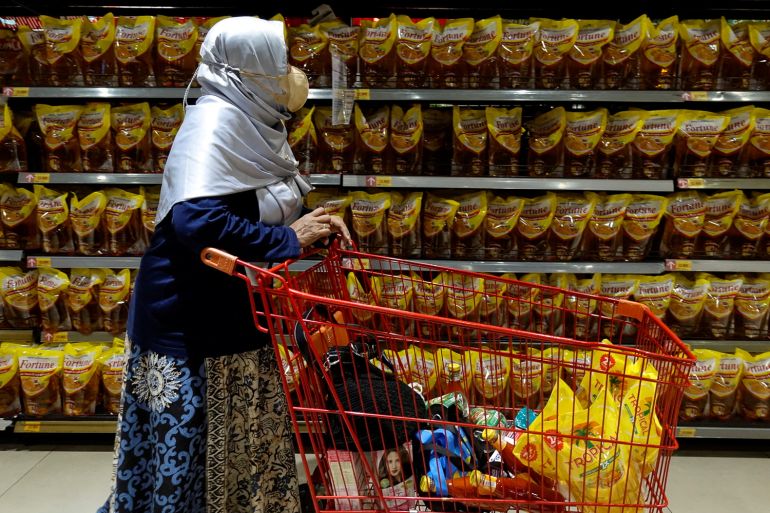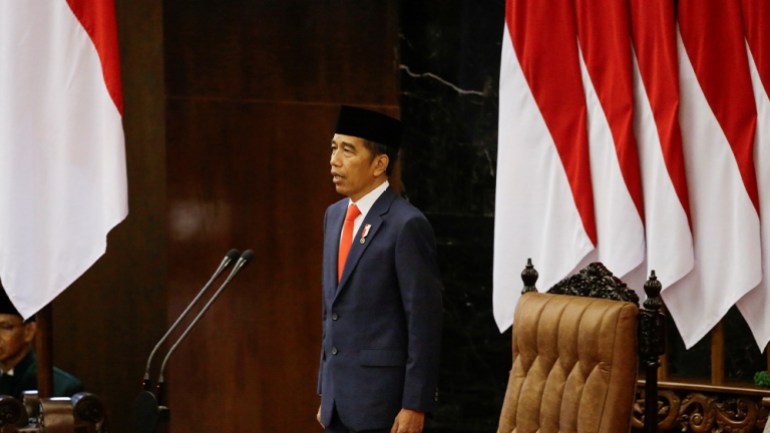‘Hurting the vulnerable’: Indonesia’s palm oil ban ignites prices
Ban on palm oil exports adds to global food security fears amid poor harvests and the war in Ukraine.

Medan, Indonesia – Indonesia’s ban on palm oil exports is sending soaring cooking oil prices even higher worldwide, exacerbating global food security fears amid adverse weather and the war in Ukraine.
The export ban, announced by President Joko “Jokowi” Widodo on Friday, comes as global food supplies come under strain due to disappointing harvests in some countries, export disruptions due to the Russian invasion of Ukraine, and labour shortages caused by the COVID-19 pandemic.
Keep reading
list of 4 itemsWorld military spending hits all-time high, tops $2 trillion
Nicaragua quits ‘diabolical’ regional bloc OAS after election row
Twitter kicks off deal negotiations with Tesla boss Musk: Report
Prices of palm oil on Monday rose more than 6 percent on the Bursa Malaysia Derivatives Exchange, coming close to the all-time high reached in March.
“Indonesia is a leading producer of palm oil and its ban means that we have a supply shock on vegetable oil that will push prices higher, adding to food price pressure and hurting those most vulnerable in developed countries and those with a high food weight basket like India,” Trinh Nguyen, a senior economist for emerging Asia at Natixis in Hong Kong, told Al Jazeera.
Nguyen said the ban would exacerbate labour shortages in Malaysia, the world’s second-largest producer of palm oil after Indonesia.
“This means Malaysia gains from higher prices but won’t make up for the supply shock and so we should have a global supply shortage that impacts global food prices,” she said.
Global prices of crude palm oil (CPO), the main ingredient in Indonesian cooking oil, have been rising sharply for months.
Indonesia restricted palm oil exports in January, before scrapping the restrictions in March, and the new ban is seen as complementing Jokowi’s policy of disbursing direct cash assistance for cooking oil.

In a video address on Friday, Widodo justified the ban as necessary to ensure the availability of food products at home amid soaring inflation worldwide.
“I will monitor and evaluate the implementation of this policy so availability of cooking oil in the domestic market becomes abundant and affordable,” Jokowi said.
The ban is due to come into effect on April 28 and Indonesia has not indicated how long it might last.
“Since March, the price of crude palm oil has soared and the ban on palm oil exports by the Indonesian government will certainly exacerbate the increase in CPO prices on the global market,” Ega Kurnia Yazid, a research assistant at the the Centre for Strategic and International Studies in Jakarta, told Al Jazeera. “This increase will also likely be followed by an increase in the prices of substitute products like canola oil, olive oil and coconut oil.”
Following the announcement of the ban on Friday, the price of soybean oil, the second most used vegetable oil after palm oil, rose 4.5 percent, while some supermarkets in the United Kingdom announced they would limit sales of olive, sunflower and rapeseed oil to two or three items per customer.
“The ban will hurt both exporters and importers and will be trade distortionary,” Tim Harcourt, chief economist at the University of Technology in Sydney, told Al Jazeera.
“It will ultimately be bad for Indonesia and Malaysia, coming at a time of blockages to international trade and global supply chains and the threat of higher inflation globally.”
Yazid concurred, saying the ban could affect global trust in Indonesia and cause chaos for those who buy its palm oil.
“Many countries depend on palm oil supplies from Indonesia,” he said. “This regulation could certainly trigger uncertainty from Indonesia’s trading partners, and the credibility of Indonesia as a trading partner could be questioned. Not to mention that this will disrupt previously agreed palm oil trading contracts.”
Panic buying
On Monday, shares in Indonesian palm oil producers dropped sharply, with some companies experiencing losses of more than 6 percent.
Apart from cooking oil, palm oil is used for a wide variety of products from chocolate to cosmetics and biofuel.
“Palm oil is also used in packaged goods like shampoo, so the ban adds to overall price pressure globally for households,” Natixis’ Nguyen said.
While the ban has sent shockwaves through global markets, some Indonesian analysts argue Jarkata is right to put local consumers first.
“I don’t think the prohibition was sudden, because the government has a domestic market obligation which requires businesses to prioritise supply to the domestic market under certain conditions,” Agus Eko Nugroho, an analyst at the Indonesian National Research and Innovation Agency, told Al Jazeera.
Nugroho said that the economic crisis triggered by the COVID-19 pandemic was starting to subside and the country needed to maintain the momentum of economic recovery in 2022.
“But the pressure of food inflation globally could reduce consumption in poor households in Indonesia, increasing poverty,” he said. “Domestic and foreign price disparities should not lead to shortages in the domestic market, which could potentially lead to panic buying.”